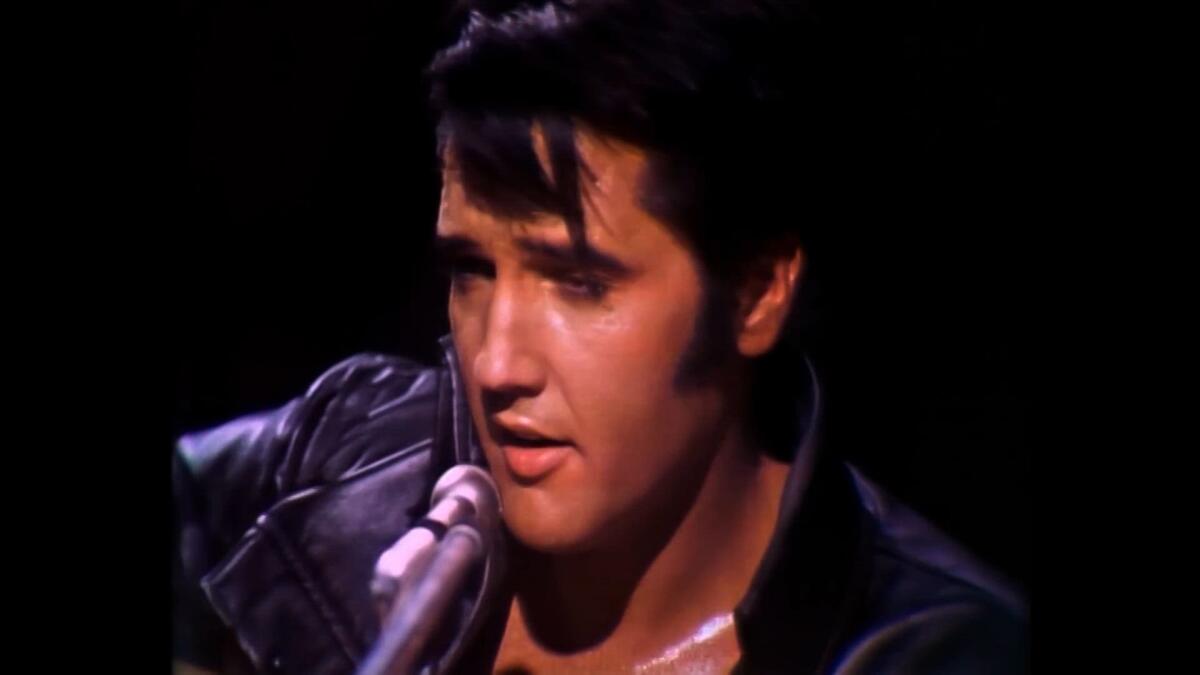Calendar Feedback: Elvis is having a moment and the debate on ‘Oppenheimer’ continues

Long live Elvis Presley
Elvis Presley, rightly called the King of Rock ’n’ Roll, is a gift to music that keeps on giving [“When Elvis got real gone again,” Aug. 15] . His voice resonates with musical acumen and his charisma is immeasurable. Whatever controversies may surround the life of Presley, nothing can diminish the greatness he displays in his peak performances. Thankfully, we get to have another look at the King in “Reinventing Elvis: The ’68 Comeback Special.” Long live the King.
Ben Miles
Huntington Beach
::
What Nolan shows us
I just finished reading Justin Chang’s excellent interpretation of what Christopher Nolan tried to show or not show in his brilliant movie “Oppenheimer” [“‘Oppenheimer’ doesn’t show us Hiroshima and Nagasaki. That’s an act of rigor, not erasure,” Aug. 14]. The interpretation he offers is excellent, but I am writing to you in response to his final paragraph. So many times, film directors underestimate the intelligence of audiences. Nolan makes intelligent films and trusts his audiences to think for themselves. I thank Nolan for doing that, and I thank Mr. Chang for pointing out that he does.
Horace Morana
San Luis Obispo
::
The criticism of “Oppenheimer’s” lack of showing the gruesome effects of the atomic bombings of Hiroshima and Nagasaki is understandable [“Critics object to film’s victim erasure,” Aug. 7]. However, unless one has not read John Hersey’s “Hiroshima” or Robert Jay Lifton’s “Death in Life: Survivors of Hiroshima,” or watched the countless documentaries and movies about the bombings, you know what happened. To fault director Nolan for not showing the effects misses the point about the viewpoint of Oppenheimer.
Historian Paul Ham is probably right that the film “cannot help but be morally half-formed,” and his excellent book, “Hiroshima Nagasaki,” is convincing in that the bombings were unnecessary to win the war, but no feature film is likely to capture the full impact of the bomb’s history and effects. I hope that most “Oppenheimer” viewers will at least remember Nolan’s final point that nuclear war is still possible and that there must be an abolition of nuclear weapons to avoid more Hiroshimas and Nagasakis.
Bob Ladendorf
Los Angeles
::
Left out of hip -hop story
I enjoyed reading the history of hip-hop but was disappointed not to see any mention of De La Soul [“50 game-changing moments: How hip-hop took over the world,” Aug. 13] . Who decided to say no go to including them?
Pablo Prietto
Los Angeles
::
Silent films on public television
Robert Lloyd’s thoughtful recounting of the evolution of movies on television overlooked one key outlet: public television [“It’s still the same old story: We need TCM,” Aug. 6]. Growing up with PBS and its precursor, National Educational Television (NET), I was raised on a diet of nicely curated classic cinema, in particular “The Toy That Grew Up” — a weekly deep dive into classic works of silent film — which, as a 10-year-old, cultivated a lifelong passion for this fascinating genre.
R.C. Price
San Clemente
More to Read
The biggest entertainment stories
Get our big stories about Hollywood, film, television, music, arts, culture and more right in your inbox as soon as they publish.
You may occasionally receive promotional content from the Los Angeles Times.










